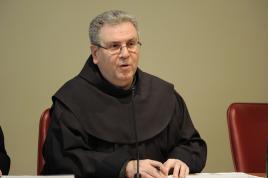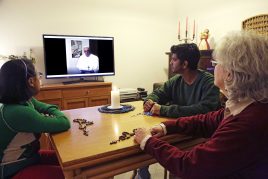
“When I first went out after the quarantine I was shocked at the sight of empty public spaces, closed shops, with the Old City virtually deserted. I was taken aback when the confreres in Tabgha or Capernaum informed me that there is nobody there, those in Tabor stating that all taxi drivers are quarantined and that nobody visits the sanctuary anymore.”
 Father Francesco Patton, Custos of the Holy Land, thus described to SIR the Holy Land at the time of the Coronavirus. Until a few weeks ago groups of pilgrims animated Jerusalem, Bethlehem and the main shrines in the history of Salvation. Today the landscape has changed completely. According to the Franciscan Pilgrims’ Office in Jerusalem, “all Holy Masses booked by pilgrim groups in all the shrines of the Holy Land as of March 12 have been cancelled. In March the number dropped to zero.”
Father Francesco Patton, Custos of the Holy Land, thus described to SIR the Holy Land at the time of the Coronavirus. Until a few weeks ago groups of pilgrims animated Jerusalem, Bethlehem and the main shrines in the history of Salvation. Today the landscape has changed completely. According to the Franciscan Pilgrims’ Office in Jerusalem, “all Holy Masses booked by pilgrim groups in all the shrines of the Holy Land as of March 12 have been cancelled. In March the number dropped to zero.”
Cases of infection. As from March 20, 705 Israelis tested positive for Covid-19, 15 of whom have been hospitalized, 10 in serious condition, tens of thousands are in home quarantine, 6,000 of whom are IDF soldiers. The Palestinian Territories reported 48 cases, 37 of which in Bethlehem alone, 3900 Palestinians are under quarantine. “These figures are bound to grow with the number of daily swabs”, said Father Patton, who openly described “Israel and Palestine as two quarantined countries.” “In fact, the restrictive measures adopted to contain the contagion are virtually the same: to stay home and go out only for essential necessities (work, groceries and medicines). The primary objective is to avoid the collapse of hospitals and intensive care units.” Just as in Italy. The Latin Patriarchate of Jerusalem and the Custody have also shared precautionary guidelines to contain the spread of the coronavirus.
 Prayer pilgrimages. No more pilgrimages for the time being, this is the time to undertake
Prayer pilgrimages. No more pilgrimages for the time being, this is the time to undertake
“a pilgrimage of incessant prayer to eradicate the virus”
“a prayer for the sick, for health workers forced to exhausting shifts, for those who assist the elderly and vulnerable, for priests and for all those who offer their lives to help others”. This “pastoral care in times of epidemics” draws sustenance from the Lenten passage from the Gospel, which reads: “when you pray, go into your room, close the door and pray to your Father, who is unseen. Then your Father, who sees what is done in secret, will reward you.”
“One aspect that must be rediscovered – added the Franciscan friar – is the communion of Saints. I strongly emphasize this point. There is a real union between us, and that union is effected not by a more or less close distance, let alone by the Internet, but by the Holy Spirit – a communion in both suffering and joy.”
Rays of light. “The situation is dramatic,” he said, “but there are also small rays of light that emerge. These are, for example, the reflections of many confreres who are rediscovering, in this period of forced pause, moments of fraternal life, of community prayer. The emptiness left by the pilgrims has caused great disorientation, but it is coupled by the awareness of recovering themes of religious life underlying our mission. That’s precisely what I experienced in the two weeks I spent under quarantine: meditation, prayer and study.” Thus in the Shrines and the Holy Places life goes on. “The Franciscan community in Bethlehem, said Father Patton – tested negative for the virus. This means that the decision to close the borders taken by the Palestinian National Authority, in agreement with Israeli Security, is proving effective in containing the virus in the territories. Also churches, mosques and synagogues have been closed.”
The closing of the Nativity church, one of the most treasured holy places of pilgrims from all over the world, came as a shock…
In Bethlehem the Nativity church is closed but the nearby church of St. Catherine is open. Yesterday I celebrated the feast of St. Joseph in Nazareth. There were only 10 people but the solemnity of the feast was respected. Praise to God is part of our mission as well as the prayer of intercession. We do everything with solemnity to transmit this spirit to the faithful that should never be lacking, and especially now.
We are preparing for Easter: is there a risk that the Holy Sepulchre may be closed as well?
Under the established restrictions, no more than a maximum of 10 people are allowed in places of worship, mosques, churches and synagogues at any one time. Clearly, this will have to be taken into account. But we also know that there are large and well-ventilated places, where more than one group is allowed at the same time. What we are trying to do is to continue praying, to keep the churches open for private visits and individual prayers.
The virus is severely affecting the Israeli economy and the already weak Palestinian economy. Prayer must be complemented by concrete solidarity. What steps have you taken in this regard to cope with this emergency?
In parishes we are committed to offering all possible material help to people in need. If the virus should continue spreading for much longer, the problem will be that of helping the unemployed, people living in the most affected areas and those that are most dependent on the presence of tourists and pilgrims. I believe that in the coming weeks, and perhaps even months, there will be a greater need for solidarity on the part of the Christian community worldwide. Most of the local faithful work in the religious tourism sector. This will entail greater sacrifice because the virus is having severe economic consequences in many other countries, in Europe and around the world. We will be able to cope with the situation for a few months, but after that time it will be tough for everyone…
The traditional Good Friday Collection for the Holy Land, next April 10, is a precious support…
It certainly is, but we will have to see when it can be done. Depending on the situation in the various countries, it might be postponed to a later date.
Talking of the Collection in time of pandemic may sound brazen, but it must be remembered that this Collection involves human lives and the survival of this small Christian community.
You previously mentioned that Israel and Palestine are two quarantined countries. Has the coronavirus somehow brought Israelis and Palestinians closer together?
The two peoples are united by the fight against the same enemy. They are cooperating in this state of emergency. The virus has driven them to put aside their disagreements and thereby initiate an exchange of further information and precautionary measures.
 Last night Italy gathered in prayer for the recitation of the Rosary, an initiative of the Italian Bishops’ Conference which saw the participation of Pope Francis and many other Churches throughout the world…
Last night Italy gathered in prayer for the recitation of the Rosary, an initiative of the Italian Bishops’ Conference which saw the participation of Pope Francis and many other Churches throughout the world…
The entire Middle East is praying for Italy. Everyone here remembers the friendship, closeness, generosity and solidarity shown by Italians. I want the faithful of Italy and throughout the world to know that we continue to pray. In Nazareth, in Bethlehem, in Jerusalem, at the Sepulchre we are always praying, the Greeks, the Latins, the Armenians, with all the necessary precautions. We pray in the place where Jesus offered his life for the salvation of the world and where he defeated death forever. We pray to God that no one may feel alone at this moment, the sick, families, health care workers, governors and administrators who are called to make sometimes unpopular and painful choices, bishops, parish priests… May our prayer sustain the hope of all.










